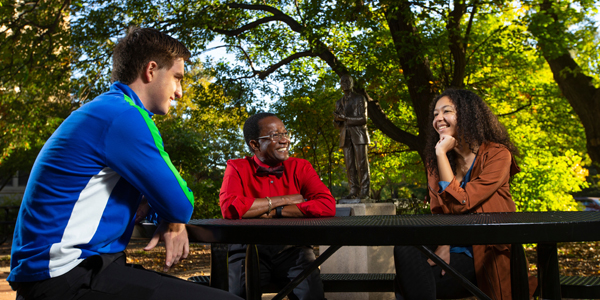
Living Carver’s Legacy
George Washington Carver’s spirit lives on. Teachers like Andrew Manu, professor of agronomy, embody what Carver was about—pursuing engaged learning and making a difference in the lives of others.
Professor Manu (’79 agronomy, ’84 PhD), was appointed the first George Washington Carver Chair at Iowa State in 2009. The position recognizes his dedication to students and his leadership in service on and off campus.
“I have been blessed to work for Iowa State,” says Manu. “On behalf of my family, and more so my teachers from the rural schools in Ghana, both who have passed on and those who are alive today, I extend my sincerest gratitude to be linked to this genius of a scientist, a humanitarian and above all a great teacher. I hope I live to meet an iota of his level and standards.”
The trust to support the position was created by Iowa State agronomy alumnus Raymond Baker, who provided $1 million, and the state of Iowa, which appropriated $250,000 in fiscal years 2008 and 2009.
Manu also serves as professor-in- charge of the George Washington Carver Academy at Iowa State. The academy is a four-year scholarship and academic support program for high-achieving multicultural students. Manu encourages and mentors academy scholars— characteristics he has been recognized for with a number of awards, including the Soil Science Education and Extension Award and the Agronomic Residence Teaching Award from the American Society of Agronomy.
Manu gives his students a lot of the credit: “Students here are very motivated. That’s really what gets me going.”
Among the many hats Manu wears, one is as a researcher. One of his projects is the Low Altitude Remote Sensing Research Initiative, in which he and his student are refining use of unmanned aerial vehicles (UAVs, or drones) for practical applications.
Experience gained is being translated to Africa, where Manu has been leading a student travel course to his home country of Ghana since 2012. With support from the U.S. Agency for International Development through the International Fertilizer Development Center, they have been developing models from drone data to better forecast end-of-season rice yields from mid-season aerial information.
“If we are able to predict a deficit of rice in the middle of the growing season, that gives the local government more time to import what people are going to need or plan to export to take advantage of a surplus,” says Manu.
Research associate Thomas Lawler (’13 agronomy, ’16 MS soil science) has worked closely with Manu on the drone program.
“One of the joys of working under Dr. Manu has been the opportunity to travel internationally,” Lawler says. “I’ve seen that people everywhere have the same goals to improve their farms and take care of their environment.”
Manu likes to broaden students’ horizons, whether it’s taking them to Des Moines to participate in World Food Prize activities or to Africa to work with smallholder farmers. He is thankful for Iowa State’s support, which has given him such opportunities and allowed him to “nurture brilliant students of all social status, class, position or race.”
Sounds like something Carver would say.



